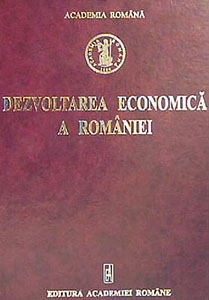 |
ROMANIA'S ECONOMIC DEVELOPMENT. COMPETITIVENESS
AND INTEGRATION INTO THE EUROPEAN UNION
Abstract
The purpose of this volume is the discussion of the issues concerning the transition of Romania's economy to the sustainable development and increasing competitiveness stages, along with the wide opening towards the world through the EU integration and globalisation.
The 56 chapters, organised in seven theme sections, deal with the most important present aspects.
|
|
Among them we find: sustainable development challenge, economic criteria of the accession to the EU, economic concurrence, comparative economic performance, estimates of Romania's economic development to 2010, determinants of growth in modem times, sectoral policies concerning the restructuring and development, integration and its impact, regional development, social protection reforms, reforming the European institutions and globalisation challenges.
On the launching of the ESEN 3 Programme (in January 2003), messages and papers were presented by personalities of our political and scientific life such as Mr Ion Iliescu, President of Romania, Academician Eugen Simion, President of the Romanian Academy, ministers, a representative of the employers' organisations, etc. The above messages and papers are included in the first section of this volume.
It is quite certain that Romania cannot fill the gap in various fields, if compared with the developed countries, without making major efforts to achieve a relatively high rate of economic growth and deep restructuring and modernisation of the economic branches while ensuring the economic and social stability. The objectives as well as the requirement for achieving the necessary pace and restructuring are dealt with in the second section.
Romania is one of the European countries having important natural resources that cannot be ignored for the economic growth. But the strategies for the transition to the sustainable development require new evaluation and priorities in relation to the following: the environment protection, the re-orientation of the demographic development policies, the quantitative and qualitative improvement of the human capital and technological and entrepreneurial competence and capability, the development of the financial and capital markets, the modernisation and stimulation of the economic agents, the competition stimulation, etc. These important issues are dealt with in the third section.
Following the institutional changes in the last 14 years and the openness required by the integration into the European Union, further clarification and orientation of the industrial and agricultural policies, public services policies and commercial policies with the Community and non-Community countries are required. Also, it is necessary to reveal the impact of the integration on the structure and efficiency of Romania's foreign trade and on the evolution of the national economy profile, and to implement active policies for regional development and social protection reforms. All these aspects are approached in the fourth, fifth and sixth sections.
To reveal the need for further changes in the Romanian economy and society in close relation with the EU ones, the volume includes a final section concerning the reform of the Community institutions and the new globalisation challenges.
|



